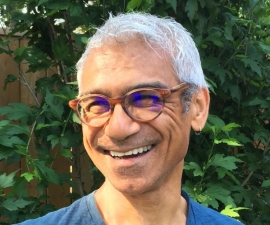

Research Bio
Michael Mascarenhas is an environmental sociologist. Mascarenhas studies environmental justice or the uneven distribution of environmental harms among different social groups or categories. Within the field of environmental justice, he examines and explore a specific form of environmental inequality, the phenomenon of environmental racism, or the deliberate targeting of communities of color for toxic environs, both physically in terms of forms of pollution, and socially, in terms of decision-making structures that produce uneven environmental conditions. For most of his career, questions concerning access to water resources for BIPOC populations and environmental justice have dominated his research and writing agendas. Mascarenhas is a Professor in the Department of Environmental Science, Policy and Management. Mascarenhas is the author of Toxic Water, Toxic System: Environmental Racism and Michigan’s Water War (2024), New Humanitarianism and the Crisis of Charity: Good Intentions on the Road to Help (2017), and Where the Waters Divide Neoliberalism, White Privilege, and Environmental Racism in Canada (2012). Mascarenhas also edited Lessons in Environmental Justice: From Civil Rights to Black Lives Matter and Idle No More
Mascarenhas holds an MS in forestry from the University of British Columbia (UBC) and a PhD in sociology from Michigan State University. He was a postdoctoral fellow at the Centre for Applied Ethics at UBC and has held teaching appointments at Kwantlen Polytechnic University and Rensselaer Polytechnic Institute. In over a dozen publications, he has written on water, wolves, seed-saving, standards, supermarkets, public participation, family farms, and forests. His current research and book project examines water access in the cities of Flint and Detroit. Mascarenhas was an expert witness at the Michigan Civil Rights Commission in 2017 on the Flint Water Crisis, and an invited speaker to the National Academies of Sciences, Engineering, and Medicine’s Committee on Designing Citizen Science to Support Science Learning.
Research Expertise and Interest
environmental justice, critical race theory, Post-colonial theory, Science and Technology studies
